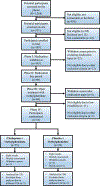A Double-Blind Randomized Placebo-Controlled Trial of Citalopram Adjunctive to Stimulant Medication in Youth With Chronic Severe Irritability
- PMID: 31128268
- PMCID: PMC9706653
- DOI: 10.1016/j.jaac.2019.05.015
A Double-Blind Randomized Placebo-Controlled Trial of Citalopram Adjunctive to Stimulant Medication in Youth With Chronic Severe Irritability
Abstract
Objective: Despite the clinical importance of chronic and severe irritability, there is a paucity of controlled trials for its pharmacological treatment. Here, we examine the effects of adding citalopram (CTP) to methylphenidate (MPH) in the treatment of chronic severe irritability in youth using a double-blind randomized placebo-controlled design.
Method: After a lead-in phase of open treatment with stimulant, 53 youth meeting criteria for severe mood dysregulation (SMD) were randomly assigned to receive CTP or placebo (PBO) for 8 weeks. A total of 49 participants, 48 of them (98%) meeting disruptive mood dysregulation disorder (DMDD) criteria, were included in the intent-to-treat analysis. The primary outcome measure was the proportion of response based on improvements of irritability at the week 8 of the trial.
Results: At the end of the trial, a significantly higher proportion of response was seen in those participants randomly assigned to CTP+MPH compared to PBO+MPH (35% CTP+MPH versus 6% PBO+MPH; odds ratio = 11.70, 95% CI = 2.00-68.16, p = 0.006). However, there were no differences in functional impairment between groups at the end of the trial. No differences were found in any adverse effect between treatment groups, and no trial participant exhibited hypomanic or manic symptoms.
Conclusion: Adjunctive CTP might be efficacious in the treatment of chronic severe irritability in youth resistant to stimulant treatment alone.
Clinical trial registration information: A Controlled Trial of Serotonin Reuptake Inhibitors Added to Stimulant Medication in Youth With Severe Mood Dysregulation; https://clinicaltrials.gov; NCT00794040.
Keywords: RCT; citalopram; disruptive mood dysregulation disorder; irritability; methylphenidate.
Published by Elsevier Inc.
Conflict of interest statement
Disclosure: Drs. Towbin, Vidal-Ribas, Brotman, Pickles, Overman, McNeil, Haring, Pine, Leibenluft, and Stringaris and Mss. Miller, Kaiser, Vitale, Engel, Davis, Lee, Wheeler, Yokum, Roule, Wambach, and Sharif-Askary have reported no biomedical financial interests or potential conflicts of interest.
Figures



Comment in
-
Editorial: Antidepressants to the Rescue in Severe Mood Dysregulation and Disruptive Mood Dysregulation Disorder?J Am Acad Child Adolesc Psychiatry. 2020 Mar;59(3):339-341. doi: 10.1016/j.jaac.2019.05.016. Epub 2019 May 22. J Am Acad Child Adolesc Psychiatry. 2020. PMID: 31128267
Similar articles
-
Improvements in Irritability with Open-Label Methylphenidate Treatment in Youth with Comorbid Attention Deficit/Hyperactivity Disorder and Disruptive Mood Dysregulation Disorder.J Child Adolesc Psychopharmacol. 2018 Jun;28(5):298-305. doi: 10.1089/cap.2017.0124. Epub 2018 Apr 30. J Child Adolesc Psychopharmacol. 2018. PMID: 29708762 Free PMC article.
-
A double-blind, randomized, placebo-controlled trial of a computer-based Interpretation Bias Training for youth with severe irritability: a study protocol.Trials. 2018 Nov 14;19(1):626. doi: 10.1186/s13063-018-2960-5. Trials. 2018. PMID: 30428909 Free PMC article.
-
Editorial: Antidepressants to the Rescue in Severe Mood Dysregulation and Disruptive Mood Dysregulation Disorder?J Am Acad Child Adolesc Psychiatry. 2020 Mar;59(3):339-341. doi: 10.1016/j.jaac.2019.05.016. Epub 2019 May 22. J Am Acad Child Adolesc Psychiatry. 2020. PMID: 31128267
-
Revisiting stimulant use for emotional dysregulation in attention-deficit/hyperactivity disorder (ADHD).Expert Rev Neurother. 2023 Jul-Dec;23(11):981-994. doi: 10.1080/14737175.2023.2263645. Epub 2023 Oct 27. Expert Rev Neurother. 2023. PMID: 37747111 Review.
-
Immediate-release methylphenidate for attention deficit hyperactivity disorder (ADHD) in adults.Cochrane Database Syst Rev. 2021 Jan 18;1(1):CD013011. doi: 10.1002/14651858.CD013011.pub2. Cochrane Database Syst Rev. 2021. PMID: 33460048 Free PMC article.
Cited by
-
A Mini-Review of Pharmacological and Psychosocial Interventions for Reducing Irritability Among Youth With ADHD.Front Psychiatry. 2022 Feb 14;13:794044. doi: 10.3389/fpsyt.2022.794044. eCollection 2022. Front Psychiatry. 2022. PMID: 35237188 Free PMC article. Review.
-
A Randomized Controlled Trial of Computerized Interpretation Bias Training for Disruptive Mood Dysregulation Disorder: A Fast-Fail Study.J Am Acad Child Adolesc Psychiatry. 2022 Jan;61(1):37-45. doi: 10.1016/j.jaac.2021.05.022. Epub 2021 Jun 17. J Am Acad Child Adolesc Psychiatry. 2022. PMID: 34147585 Free PMC article. Clinical Trial.
-
The Clinician Affective Reactivity Index: Validity and Reliability of a Clinician-Rated Assessment of Irritability.Behav Ther. 2020 Mar;51(2):283-293. doi: 10.1016/j.beth.2019.10.005. Epub 2019 Nov 27. Behav Ther. 2020. PMID: 32138938 Free PMC article.
-
How and Why Are Irritability and Depression Linked?Child Adolesc Psychiatr Clin N Am. 2021 Apr;30(2):401-414. doi: 10.1016/j.chc.2020.10.009. Child Adolesc Psychiatr Clin N Am. 2021. PMID: 33743947 Free PMC article. Review.
-
Diagnostic instruments for the assessment of disruptive mood dysregulation disorder: a systematic review of the literature.Eur Child Adolesc Psychiatry. 2023 Jan;32(1):17-39. doi: 10.1007/s00787-021-01840-4. Epub 2021 Jul 7. Eur Child Adolesc Psychiatry. 2023. PMID: 34232390 Free PMC article.
References
-
- Stringaris A, Vidal-Ribas P, Brotman MA, Leibenluft E. Practitioner review: Definition, recognition, and treatment challenges of irritability in young people. J Child Psychol Psychiatry Allied Discip. 2017;59:721–739. - PubMed
Publication types
MeSH terms
Substances
Associated data
Grants and funding
LinkOut - more resources
Full Text Sources
Medical

